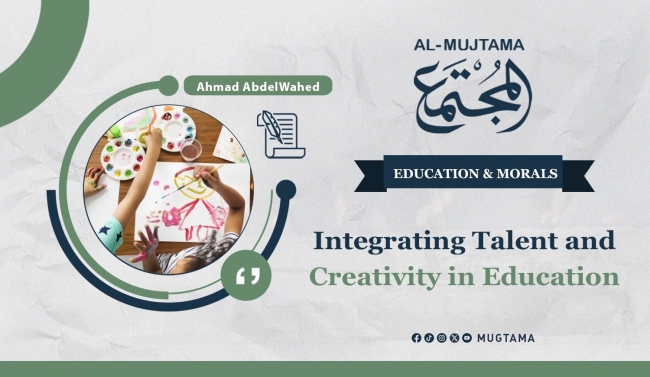Integrating Talent and Creativity in Education
With students starting the new academic year, the need for a qualitative shift in the educational system and its final outcomes becomes increasingly apparent. Often, the focus is more on the quantity of learning rather than its quality, which undermines the desired results in our Arab countries.
Frankly speaking, we are entrenched in theoretical knowledge at the expense of practical applications, skills development, and modern educational activities that prepare students to interact with the realities of the era, to be producers of knowledge, and to contribute to all that is new and beneficial for humanity.
In this context, I am particularly concerned with activity periods, or creative periods, which focus on developing talents, unleashing students’ creativity, enhancing their mental capabilities, fostering their sense of innovation, and improving their ability to solve problems in non-traditional ways.
Experts and proponents of modern teaching methods advocate for the expansion of “thinking outside the box” classes that invest in students’ abilities and explore their talents. This is the key to success in educational systems implemented by developed countries.
From personal experience, I recall how expression classes served as a window for me to explore my writing capabilities, along with school radio activities and journalism exhibitions. These activities indirectly sharpened my skills and shaped my future orientation towards journalism and writing.
Similarly, scientific classes, games, and other activities like agriculture, industrial arts, and home economics produced successful models in various fields and crafts. These just needed a bit more attention and development to produce innovators and inventors and to groom exceptional players in different sports competing in top continental and international championships.
I claim that this approach has fallen back in some of our Arab schools due to crowded classrooms, the spread of private tutoring, exam leaks, and other negative phenomena that have harmed the educational outcomes. The most concerning issue is guiding students to study based on university admission criteria without considering their interests, abilities, and talents. However, the situation might be different in other Arab countries that pay attention to activity periods and creative classes.
Successful System
In this context, there are modern ways to measure a student's intelligence, understand their abilities, and determine their interests and orientations, not just based on their grades, but also on other factors such as their ability to be creative, think critically, solve problems, be flexible, negotiate, remain positive, make decisions, manage people, and work with others.
These methods provide a solid foundation for a successful educational system, as seen in Germany, which applies a system that places students in schools matching their academic performance and cognitive abilities. Students are divided into three categories: high achievers go to "Gymnasium" schools, average performers attend “Realschule” schools, and those with limited performance go to “Hauptschule” schools, which focus on learning and mastering professional crafts.
I believe that our Arab countries are in dire need of adopting this approach, considering the labor market needs and future job requirements, which are rapidly moving towards artificial intelligence, massive technological advancements, and a third-millennium world operating under the “remote” banner, whether in education, shopping, investment, or even remote medical treatment and surgeries.
Years ago, students in Germany built a model house relying solely on solar energy and producing a surplus, while others from Egypt designed a robot capable of detecting pests that affect farmland. A Moroccan student team invented a solar-powered car, and another succeeded in manufacturing a smart chair to assist people with disabilities. These projects were accomplished with an innovative spirit and creative energy, thinking outside the box.
Therefore, as we begin the new academic year, I propose an initial blueprint that focuses on dedicating a daily period for experimentation and innovation, with various student activities accumulating practical experience according to the students' age group. For example, a period for a radio program presentation, another for conducting a scientific experiment, a third for preparing food, a fourth for inventing a simple machine, a fifth for public speaking and oration, a sixth for developing a feasibility study, a seventh for fun and competition, an eighth for learning debating and negotiation skills, a ninth for proposing unconventional ideas, and so on. These activities should meet students' needs and uncover their potential.
Among the suggested ideas in this regard is the attention to scientific clubs, robotics clubs, organizing programming competitions, artificial intelligence tests, cybersecurity, building models for engineering projects, constructing drones, simulating investment, managing small projects, handling social media, organizing awareness campaigns, conducting writing, design, and photography workshops, providing first aid, civil defense, manual and craftwork, and recycling and environmental protection.
Student activities are many and varied, and it is possible to design activities that suit each community individually and match the students' age group, with creativity being the motto of our daily period. The goal should be to discover a scientist, shape an advocate, inspire an inventor, or graduate a top-level technician or craftsman who achieves desired outcomes both nationally and across the Arab world as the best investment in human resources.
This is undoubtedly a culture that must be reinforced in our schools and educational institutions by activating student initiatives as part of a positive culture to be instilled in every student. The essence of this culture is that education can make a difference, solve a problem, and improve life around them, not just obtain grades and certificates. Knowledge without action is like a tree without fruit.
-------------------------------------------------------------


